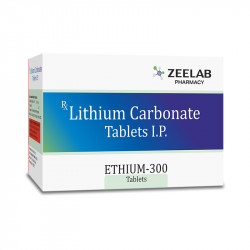Lithium Carbonate
Lithium Carbonate is a medication primarily used to treat and manage bipolar disorder by stabilizing mood swings. It is also prescribed for conditions like recurrent depression and certain types of aggressive behavior. Lithium helps reduce the frequency and intensity of mood episodes, making it an essential treatment for individuals experiencing extreme highs (mania) and lows (depression). It works by affecting neurotransmitters in the brain, helping to regulate mood and emotions. Regular monitoring of lithium levels is necessary to prevent toxicity and ensure effective treatment. It is available in tablet and extended-release forms.
Uses of Lithium Carbonate
- Treatment of bipolar disorder
- Prevention of manic and depressive episodes
- Management of recurrent depression
- Control of aggressive or impulsive behaviors
- Used as an adjunct treatment for certain psychiatric conditions
How Lithium Carbonate Works
Lithium Carbonate works by altering the balance of neurotransmitters in the brain, helping to stabilize mood. It affects nerve signal transmission and modulates serotonin and dopamine levels, reducing extreme mood fluctuations. This regulation helps control manic episodes and depressive symptoms in bipolar disorder.
Benefits of Lithium Carbonate
- Effectively stabilizes mood in bipolar disorder
- Reduces the severity of manic episodes
- Prevents recurrence of mood swings
- Helps in managing aggressive and impulsive behavior
- Improves overall emotional stability
How to Take Lithium Carbonate
Take Lithium Carbonate exactly as prescribed by your doctor. It is usually taken with or after meals to reduce stomach discomfort. Swallow the tablet whole with a glass of water. Do not crush or chew extended-release tablets. Regular blood tests are required to monitor lithium levels and avoid toxicity. Stay hydrated and follow a balanced diet while on this medication.
Types of Dosage Available
- 300 mg tablets
- 450 mg extended-release tablets
- 600 mg extended-release tablets
Side Effects of Lithium Carbonate
- Nausea and vomiting
- Diarrhea
- Increased thirst and urination
- Hand tremors
- Weight gain
- Dizziness and drowsiness
- Muscle weakness
- Thyroid or kidney function issues (long-term use)
Safety Advice
- Monitor blood lithium levels regularly
- Drink plenty of water to prevent dehydration
- Avoid excessive caffeine and alcohol
- Inform your doctor if you have kidney or thyroid problems
- Do not take during pregnancy or breastfeeding without medical advice
- Avoid sudden changes in sodium intake
- Do not stop the medication abruptly without consulting a doctor
Frequently Asked Questions (FAQs)
Q. What is Lithium Carbonate used for?
A. Lithium Carbonate is used to treat bipolar disorder and prevent mood swings.
Q. How long does it take for Lithium Carbonate to work?
A. It may take 1 to 3 weeks to show full effects in stabilizing mood.
Q. Can Lithium Carbonate cause weight gain?
A. Yes, weight gain is a possible side effect, often due to increased appetite.
Q. Is long-term use of Lithium Carbonate safe?
A. Yes, but regular monitoring of kidney and thyroid function is necessary.
Q. Can I stop taking Lithium Carbonate suddenly?
A. No, stopping abruptly can cause mood instability. Consult your doctor before discontinuing.
Download India's most affordable pharmacy app
- Compare with medicine prices
- Save upto 90% on your medicine bills

Temperature Controlled storage and delivery

Regular Sanitization

Disinfected Packaging















 Added!
Added!